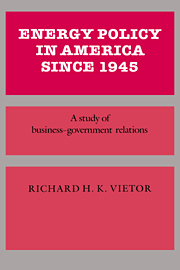Book contents
- Frontmatter
- Contents
- List of charts and figures
- List of tables
- Editors' preface
- Acknowledgments
- List of abbreviations
- 1 Introduction: The political economy of energy
- Part I The transition to peace and fluid fuels, 1945–1958
- Part II Managing surplus through the politics of stasis, 1959–1968
- 6 Oil import quotas
- 7 Formula for shortage: natural gas price controls
- 8 Synfuels revisited: nostrum for the coal industry
- Part III The second energy transition: adjustment to depletion, 1969–1980
- Index
7 - Formula for shortage: natural gas price controls
Published online by Cambridge University Press: 13 October 2009
- Frontmatter
- Contents
- List of charts and figures
- List of tables
- Editors' preface
- Acknowledgments
- List of abbreviations
- 1 Introduction: The political economy of energy
- Part I The transition to peace and fluid fuels, 1945–1958
- Part II Managing surplus through the politics of stasis, 1959–1968
- 6 Oil import quotas
- 7 Formula for shortage: natural gas price controls
- 8 Synfuels revisited: nostrum for the coal industry
- Part III The second energy transition: adjustment to depletion, 1969–1980
- Index
Summary
Shortly before John F. Kennedy took office in 1961, he received a report on regulatory agencies from James Landis, the retired chairman of the Securities Exchange Commission. Landis, amidst his general criticism of the state of government regulation, singled out the FPC for particularly harsh judgment: “The Federal Power Commission without question represents the outstanding example in the federal government of the breakdown of the administrative process. The complexity of its problems is no answer to its more than patent failures.” He concluded that these “defects stem from attitudes, plainly evident on the record, of the unwillingness of the Commission to assume its responsibilities under the Natural Gas Act and its attitude, substantially contemptuous, of refusing in substance to obey the mandates of the Supreme Court of the United States and other federal courts.”
Landis was not alone in his dismay over the Commission's failure to implement the Supreme Court's dictum for rate regulation of natural gas producers. In the six years since the court's 1954 decision that Phillips Petroleum as a gas producer was subject to FPC rate-making, natural gas prices had nearly doubled. And Landis judged that the Commission had taken the side of “monopolistic and excessive rates.” Landis, as well as other critics, felt that the Commission and its procedures, rather than any conceptual problems, were the sources of disorder.
- Type
- Chapter
- Information
- Energy Policy in America since 1945A Study of Business-Government Relations, pp. 146 - 162Publisher: Cambridge University PressPrint publication year: 1984



